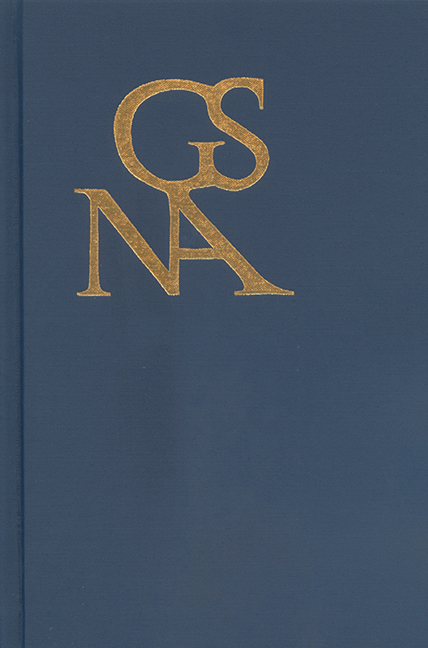Book contents
- Frontmatter
- Contents
- Special Section on Goethe and the Postclassical: Literature, Science, Art, and Philosophy, 1805–1815
- Helena, Then Hell: Faust as Review and Anticipation of Modern Times
- Histrionic Nationality: Implications of the Verse in Faust
- Die Wette in Goethes Faust
- Ecocriticism, the Elements, and the Ascent/Descent into Weather in Goethe's Faust
- Grablegung im Vorhof des Palasts: Groteske Anschaulichkeit in den vorletzten Szenen von Faust II
- Goethes Gnostiker: Fausts vergessener Nihilismus und sein Streben nach Erlösungswissen
- The Unconscious of Nature: Analyzing Disenchantment in Faust I
- Forms of Figuration in Goethe's Faust
- Goethe's Morphology of Knowledge, or the Overgrowth of Nomenclature
- Paraphrasis: Goethe, the Novella, and Forms of Translational Knowledge
- Dramas of Knowledge: The “Fortunate Event” of Recognition
- gegen: Bewegungen durch Goethes “Der Mann von funfzig Jahren”
- “Offenbares Geheimnis” oder “geheime Offenbarung”? Goethes Märchen und die Apokalypse
- Goethe's Green: The “Mixed” Boundary Colors in Zur Farbenlehre
- For Heaven's Sake, I Will Have You Walk into the Dark: Grillparzer's Containment of Beethoven and the Ambivalence of Their Melusina Project
- Imitation, Pleasure, and Aesthetic Education in the Poetics and Comedies of Johann Elias Schlegel
- Feindlich verbündet: Lessing und die Neuen Erweiterungen der Erkenntnis und des Vergnügens
- Juvenalian Satire and the Divided Self in Goethe's “Das Tagebuch”
- Book Reviews
The Unconscious of Nature: Analyzing Disenchantment in Faust I
from Special Section on Goethe and the Postclassical: Literature, Science, Art, and Philosophy, 1805–1815
Published online by Cambridge University Press: 14 March 2018
- Frontmatter
- Contents
- Special Section on Goethe and the Postclassical: Literature, Science, Art, and Philosophy, 1805–1815
- Helena, Then Hell: Faust as Review and Anticipation of Modern Times
- Histrionic Nationality: Implications of the Verse in Faust
- Die Wette in Goethes Faust
- Ecocriticism, the Elements, and the Ascent/Descent into Weather in Goethe's Faust
- Grablegung im Vorhof des Palasts: Groteske Anschaulichkeit in den vorletzten Szenen von Faust II
- Goethes Gnostiker: Fausts vergessener Nihilismus und sein Streben nach Erlösungswissen
- The Unconscious of Nature: Analyzing Disenchantment in Faust I
- Forms of Figuration in Goethe's Faust
- Goethe's Morphology of Knowledge, or the Overgrowth of Nomenclature
- Paraphrasis: Goethe, the Novella, and Forms of Translational Knowledge
- Dramas of Knowledge: The “Fortunate Event” of Recognition
- gegen: Bewegungen durch Goethes “Der Mann von funfzig Jahren”
- “Offenbares Geheimnis” oder “geheime Offenbarung”? Goethes Märchen und die Apokalypse
- Goethe's Green: The “Mixed” Boundary Colors in Zur Farbenlehre
- For Heaven's Sake, I Will Have You Walk into the Dark: Grillparzer's Containment of Beethoven and the Ambivalence of Their Melusina Project
- Imitation, Pleasure, and Aesthetic Education in the Poetics and Comedies of Johann Elias Schlegel
- Feindlich verbündet: Lessing und die Neuen Erweiterungen der Erkenntnis und des Vergnügens
- Juvenalian Satire and the Divided Self in Goethe's “Das Tagebuch”
- Book Reviews
Summary
IN GÖTTERZEICHEN, LIEBESZAUBER, SATANSKULT, Albrecht Schöne argues that Goethe has engaged in a self-censorship of Faust I, offering in the end only a highly condensed, elided version of the full Satanic ritual he initially intended for the “Romantische Walpurgisnacht.” I agree that Goethe engaged in selfcensorship, but Goethe's self-censorship in Faust I is actually more extensive, and profounder, even than that claimed by Schöne. More important, Schöne has him trying to cover up the wrong heresy: Goethe is not a closet Manichaean, and Gretchen is not in any sense a witch. Quite the contrary: I will argue that she represents a lost Hermetic consciousness of nature that has been demonized as the heretical “other” both of orthodox religion, and of science.
There is an uncanny affinity between Goethe's Faust and Freud's Traumdeutung: Freud deservedly won the Goethe Prize, but Goethe also should have won the Freud Prize. In chapter four, Freud famously compares the “dream-work” of the unconscious to the conscious stratagems of displacement and disguise employed by the dissident artist in order to defeat the censor. In the same passage, as a kind of embedded epigraph, Freud quotes Mephisto's displaced hint (“Das Beste, was du wissen kannst / Darfst du den Buben doch nicht sagen”) that there is a latent argument lurking behind Goethe's “manifest” text. And indeed there is.
Unlike Schöne, I prefer to interpret the “Romantische Walpurgisnacht” as a dream that employs precisely the same distorting devices—condensation, displacement, elision—Freud will later elaborate in his Traumdeutung. Although it is disguised as an ascent of the Brocken, what we are really given is a descent into Faust's personal unconscious: the doors through which we enter are Gretchen's swoon, and the onomatopoetic initial description of the landscape that induces vertigo. We see Mephisto working as the dream-censor, whose modus operandi (here as elsewhere) is Entstellung zum Zweck der Verstellung; as the Sphinxes reveal in part two, he is the anti-Oedipus, himself the riddle. And Mephisto's response to the Trödelhexe is especially revealing: he drags Faust away, criticizing her story as too thinly disguised, fearing that Faust might wake up inside his dream, interpret it, and achieve the precious self-knowledge that is one goal of his striving.
In the “Romantische Walpurgisnacht,” Faust's personal unconscious censors his repressed knowledge of his own guilt, offering up the dream of a witch's sabbath.
- Type
- Chapter
- Information
- Goethe Yearbook 17 , pp. 117 - 132Publisher: Boydell & BrewerPrint publication year: 2010



